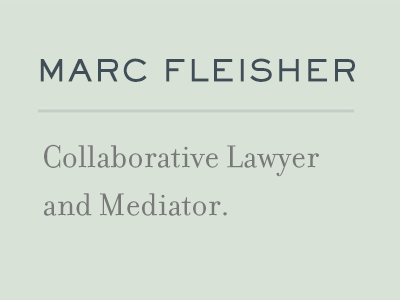Divorce mediation explained
In mediation, you and your spouse make decisions together through direct discussion. An impartial mediator helps you clarify and articulate your own perspectives and better understand the perspectives of your spouse, even if you don’t always agree with them. The mediator will also help you acquire all the information necessary to make prudent decisions. This includes complete financial disclosure.
The mediator has no vested interest in the outcome but is committed to ensuring that the process by which each of you finds your own way to an agreement is a fair one. The mediator not only refrains from imposing a solution upon you – that, after all, is what an arbitrator does – but also will not presume to advise you what you "should" do.
As a mediator, I will certainly help you generate options that are designed to address both of your articulated interests and concerns. I will also inform you about how a court might approach a particular issue and how other couples have resolved a particular issue as you may find it helpful in determining what is best for you. I am careful not to present the law as “the right answer;” it is a reference point which may or may not help ground you in determining what is fair. Each of you may accord the law (to the extent that the law is predictable) as much or as little significance as you deem appropriate. Having said that, if one of you insists on a position that is clearly outside the spectrum of possible court outcomes, and the other disagrees with it, the proponent of this position risks driving the other person out of the process and into litigation.
I am not, as a rule, a “caucuser;” I do not meet separately with the mediation participants. I think the risks of doing so outweigh the potential benefits and I believe that there is virtually nothing I might want to say to one of you that I cannot say in the presence of the other.
A more apt term for "divorce mediation" would be "separation agreement mediation.” When a couple is in the process of divorce, they need to make important decisions about, among other things, future parenting arrangements, child support, property distribution, and spousal maintenance. Once you have resolved all the issues, I will draft a separation agreement. When signed by both of you, and notarized, it becomes a legally-binding contract. That agreement is ultimately filed in court and is incorporated in the divorce judgment.
Role of Lawyers in Mediation
Choosing mediation does not mean forsaking lawyers. Although mediation participants typically do not bring an attorney to the session itself, each may wish to consult with an attorney before or between sessions. Many couples prefer not to do so until they are ready to sign the separation agreement. At that stage I strongly recommend that each of you retain independent counsel to review a preliminary draft of the agreement. Again, as with everything else in mediation, this is their decision to make.
A lawyer is just one of a number of professionals a mediation participant, like a Collaborative Practice client, may consult in making a prudent decision. Participants may consult with accountants, financial planners, child psychologists or anyone else who might help clarify important issues.
What it takes to succeed in mediation.
You must be able to engage each other on a roughly equal basis, have the capacity both to agree with each other and to disagree with each other, believe that the legal and economic issues raised by the divorce are not too complex to tackle on you own, and feel that your emotional state is such that you are up to the task of negotiating for yourself. For those who do not meet these “tests,” Collaborative Practice is the more appropriate process choice.
